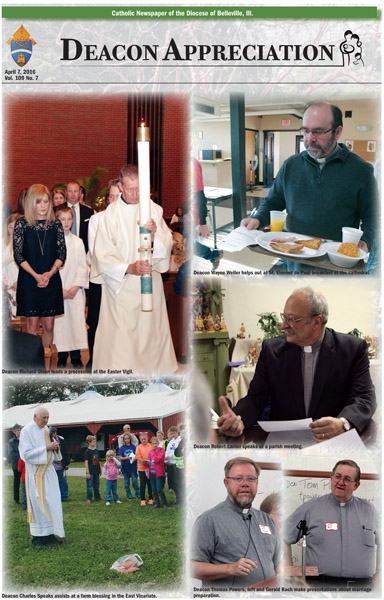By Patti Warner
Office of Deacon Formation
Just how does one become a deacon? It involves first and foremost a willingness to embark on a journey of discovery which doesn’t happen overnight. As a matter of fact, it takes about five years.
Each discernment journey is a unique one, but there are similarities in each as well. Often it begins with a question: “Have you ever thought about becoming a deacon?” This query might come from a spouse, a priest, or a friend. Or it may be a man’s own inner voice that beckons him to become more involved in parish life, and leads him to wonder how he might do that. From that first whisper a potential deacon is born.
The present deacon formation class is approximately halfway through their journey to the diaconate. They have reached this point because they responded to the voice of spouse, friend, priest, self, Church, God. They took, and continue to take, the next steps.
Once every 5 years, the diocese begins its search for new people interested in learning more about the deacon program. The process starts with two informational meetings — publicized in parish bulletins and in The Messenger — led by members of the formation staff and deacon formation committee who explain the process to those interested in learning more. If, after having a better understanding of the diaconate, someone wants to explore further, he will receive a lengthy application to complete, which outlines a person’s religious background, education, employment, health, finances and more. Additionally each applicant is required to provide references from 25 people from a variety of backgrounds — their pastor, family members, parishioners, fellow workers and friends.
After receiving the completed applications, the deacon formation committee begins to learn more about the applicants by studying the applications and conducting interviews. A psychological exam follows, and if all goes well, an applicant is admitted to the program. If the man is married, his spouse is highly encouraged to attend classes with her husband.
The next step involves a big word — propaedeutic — which is the first year of study and discernment. In this first year, candidates and+- their wives attend one-day classes once a month for nine months. They re-familiarize themselves with academic matters, such as the proper way to write and properly footnote college papers. They involve themselves more deeply in prayer and learning how to pray the Liturgy of the Hours. They begin, almost unconsciously, to form a family with their fellow aspirants. And, after this first year, once again they are scrutinized by committee members. The aspirants, and committee members, make decisions as to whether to continue in the process.
Following the propaedeutic year, the aspirants enter candidacy, when they formally profess their intentions to study for the diaconate, and the church formally accepts them into the program. From this point until hopeful ordination, the men we called “aspirants,” are now “candidates.” Their classes are not just one day per month, but now one very full weekend per month from September through June. They will study numerous topics such as Church History, Introduction to Scripture, Old Testament, and the Gospels. Each year ends with interviews to see how the candidate and his spouse are doing. They are asked to assess themselves as well as be assessed by others. They will spend time in company with the bishop.
At different intervals throughout, there are other milestones: an annual retreat, being installed as Lectors, attending a week-long Homiletics course at St. Meinrad School of Theology in Indiana, installation as Acolytes and a five-day pre-ordination retreat. All these steps and more will hopefully bring their journey, God-willing, to fruition as our bishop calls them to Holy Orders. Then the journey begins anew as they serve the Church as deacons.
For more information on the diocesan program, please email Patti Warner at [email protected]






